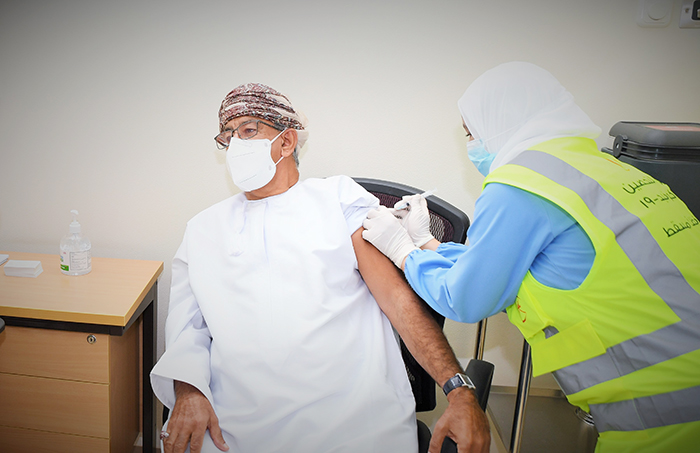
Oman’s healthcare workers’ efforts to give their all towards taking care of patients affected by COVID-19 have been praised by the Minister of Health.
Dr Ahmed bin Mohammed Al Saidi was the first in the country to be administered the COVID-19 vaccine, which will soon be rolled out to frontline workers across the Sultanate.
Oman received on Thursday evening 15,600 doses of the jab made by Pfizer/BioNTech, with the next batch of vaccines expected in the first month of next year.
“The healthcare staff have been the heroes of this period, they have worked under difficult conditions, but they have proved that they deserve the thanks and trust we all give them,” explained the minister. “I cannot thank them enough, and it’s not just at the Ministry of Health: everybody in the healthcare sector, whether public or private, and the supporting agencies as well.”
The steadfastness, dedication and spirit of the healthcare workers in the country, many of whom have worked round the clock and sacrificed much of their personal lives for the greater good, is one of the reasons the number of COVID-19 patients in intensive care have dipped across the country.
“Since October, by the grace of God, the number of cases in the country are coming down, both in terms of confirmed cases, admission numbers, and ICU patients,” said Al Saidi. “On Saturday, we had only 37 cases in intensive care across the whole country. A couple of months ago, we had 220. This would not have happened without the adherence of almost everybody to the healthy behavioural practices we have been mentioning again and again.
“Again, I want to assure everybody that yes, the vaccine has arrived, but the virus is still circulating,” he admitted. “The arrival of the vaccination today does not mean that we can abandon the healthy lifestyle practices that we have to follow. Wearing the masks where appropriate must continue. Physical distancing must continue. Hand hygiene must continue, shaking hands and hugging must absolutely not continue. Social gatherings, especially in closed places, is a definite no-no.”
The second person to receive the vaccine was Dr Jean Jabbour, the representative of the World Health Organization to Oman. He asked people to not listen to rumours regarding the ineffectiveness of vaccines or any alleged adverse effects they might cause.
“The principle of vaccination is very important,” he said. “The Sultanate has a very strong immunisation programme, and this is what makes the WHO satisfied with the impact and the national plan that was put forward by the Sultanate to vaccinate communities in Oman, increase their immunity, and help towards eradication of this pandemic.”
Commenting on the effectiveness on the vaccine over the new strain of the coronavirus, Jabbour said, “I want to say that until now, there are no studies that say the vaccine does not work on the new variant of coronavirus, and WHO, through the COVAX (COVID Alliance) facility, is observing all the vaccines that are already in use now, or will be in use in future, in order to provide full and complete information about vaccines.”
This was a message shared by Dr Ahmed Al Saidi, who urged people to come forward and receive the vaccine when called by the medical authorities. The Ministry of Health is dispensing vaccines according to a priority list, in which frontline workers, the elderly, those who are immunocompromised, and people with chronic diseases will be the first to receive it.
“The media’s role to spread the facts about the vaccine and the disease is extremely important,” he said. “There have been so many videos, so many rumours circulating on social media that have nothing to do with science, nothing to do with safety of vaccination. I urge everybody to avoid watching them
“I urge everyone who is on the priority list to not hesitate when it comes to taking this vaccine,” the minister added. “Vaccinations saved millions of lives over the decades. The best thing to ever happen in public health is the development of vaccines.”